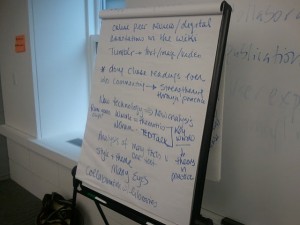- Being A Green Mother by Piers Anthony
- The Tent by Margaret Atwood
- New York Trilogy by Paul Auster
- Racing The Beam: The Atari Video Computer System by Ian Bogost and Nick Montfort
- Amulet by Roberto Bolano
- Lady Audley's Secret by Mary Elizabeth Braddon
- The Complete Cosmicomics by Italo Calvino
- The Invention of Morel by Adolfo Bioy Casares
- The Mind of Italo Calvino by Dan Cavallaro
- The Cambridge Companion to Kate Chopin
- Catching Fire by Suzanne Collins
- Mockingjay by Suzanne Collins
- Crossed by Ally Condie
- Noir by Robert Coover
- Down & Out In The Magic Kingdom by Cory Doctorow
- The Great Big Beautiful Tomorrow by Cory Doctorow
- The Last Professors: The Corporate University and the Fate of the Humanities by Frank Donoghue
- Football The First Hundred Years The Untold Story by Adrian Harvey
- My Mother Was A Computer: Digital Subjects & Literary Texts by N. Katherine Hayles
- The Map & The Territory by Michel Houllebecq
- Quests: Design, Theory, and History in Games and Narratives by Jeff Howard
- Hedda Gabler by Henrik Ibsen
- Fifty Shades Darker by E. L. James
- Fifty Shades Freed by E. L. James
- Fifty Shades of Grey by E. L. James
- The Life & Morals of Jesus of Nazareth by Thomas Jefferson
- Carmilla by Sheridan Le Fanu
- Hour of the Star by Clarice Lispector
- The Lost Books of The Odyssey by Zachary Mason
- Reality Is Broken: Why Games Make us Better and How they Can Change the World by Jane McGonigal
- Batman The Dark Knight Returns by Frank Miller
- Batman Year One by Frank Miller
- Those Guys Have All The Fun: Inside The World of ESPN by James Andrew Miller and Tom Shales
- Paradise Lost by John Milton
- Batman-The Killing Joke by Alan Moore
- V For Vendetta by Alan Moore
- The Watchmen by Alan Moore
- Speak Memory by Vladimir Nabakov
- King Lear by William Shakespeare
- Authors In Context: Virginia Woolf by Michael Whitworth
- The Uncoupling by Meg Wolitzer
- The Quran (Sher Ali Holy translation)
- Sir Gawain & The Green Knight
- The Tel Quel Reader
ThatCamp Philadelphia: Digital Humanities Integration Into Regular Literature Classrooms
The final session I attended at ThatCamp Philadelphia was run bu Janine Utell on integrating the digital humanities into regular literature classrooms.
- Amanda French defines the digital humanities as “open access”
- How can student work be put online? WordPress, PBWorks, etc
- Digital Humanities Quarterly given as example of open access
- Should give students option to take down work at the end of the semester
- I am going to try out commonplace blogs with my eng102 classes next semester
- Utell: Digital humanities is essential to keeping the humanities alive
- Some discussion about establishing comment policies
- Crowd sourcing comment policy to students
- Peer review is important before work goes online
- Instructor comments on blogs tapers off as semester goes on
- French and Siobhan Phillips bring out Google’s ngrams, wordles
- I’ve had students A/B an Obama speech to a Jefferson speech
- More incorportation of audio, video, etc into literary classes
- Modernist Journals Project
- Amanda French stresses the need to teach bibliographic software like Noodle, Evernote, and Zotero

Thomas Jefferson Wordles
Earlier this semester in Composition I I had students read one of Thomas Jefferson’s State Of The Union addresses and annotate it as part of our early discussions on literary research. What I wish I had thought to do was create a wordle of the address to see how that changes/helps student’s annotation and close reading. Recently, after I mentioned this on Twitter, another Twitter user pointed me to Governing Dynamo, a website that archives every president’s inaugural addresses but also offers wordles and other assorted new media.
The wordles are very insightful and I think can help students narrow in on what the focus of a piece of writing. I think in the spring I will use Jefferson’s first inaugural address for the annotation assignment. Wordles will add an interesting new aspect to student reading and my teaching.